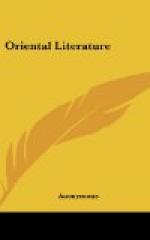Then both of them dismounted from their horses and entered into a cavern. There Khaled seized two ferocious wild beasts, and Djaida attacked and carried off a lion and two lionesses. After these exploits they exchanged congratulations, and Djaida felt happy to be with Khaled. “Meanwhile,” she said, “I shall not permit you to leave our tents until after our marriage.” She immediately left him in haste and betook herself to her own dwelling.
Khaled proceeded to rejoin the slaves whom he had left a little way off, and ordered them to carry to the tents the beasts he had slain. Trembling with fright at the view of what Khaled had done, they extolled him with admiration above all other champions of the land.
The feasts meanwhile went on, and all who came were welcomed with magnificence. The maidens sounded their cymbals; the slaves waved their swords in the air, and the young girls sang from morn till evening. It was in the midst of such rejoicings that Djaida and Khaled were married. Amima, the daughter of Moawich, held the reins of the young bride’s camel, and men and women alike extolled the glory of Djaida.
THE ABSIANS AND FAZAREANS
King Cais, chief of the Absians, distrusting the evil designs of Hadifah, the chief of the tribe of Fazarah, had sent out his slaves in every direction to look after Antar. One of these slaves on his return said to the king: “As for Antar, I have not even heard his name; but as I passed by the tribe of Tenim, I slept one night in the tents of the tribe Byah. There I saw a colt of remarkable beauty. He belonged to a man named Jahir, son of Awef. I have never seen a colt so fine and swift.” This recital made a profound impression upon Cais. And in truth this young animal was the wonder of the world, and never had a handsomer horse been reared among the Arabs. He was in all points high-bred and renowned for race and lineage, for his sire was Ocab and his dam Helweh, and these were horses regarded by the Arabs as quicker than lightning. All the tribes admired their points, and the tribe of Byah had become celebrated above all others, because of the mare and stallion which pertained to it.




